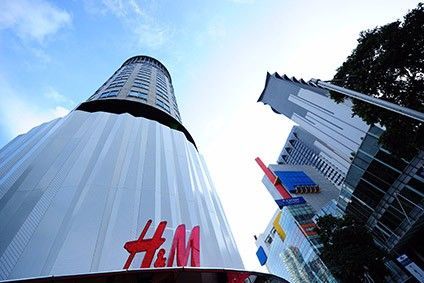
During the third quarter ending 31 August, H&M says it was impacted by a one time cost of SEK2.1m related to the winding down of its Russia operations.
Operating profit excluding the one-time cost for Russia was SEK3bn versus SEK6.3bn (US$264.6m) on a year earlier corresponding to an operating margin of 5.2% (versus 11.3% a year earlier).
The reported operating profit was SEK902bn versus SEK6.3bn a year earlier corresponding to an operating margin of 1.6% (versus 11.3% a year earlier).
H&M says it is now implementing a “cost and efficiency programme” aimed at further streamlining the business.
Overall, this is expected to result in annual savings of around SEK2bn. The savings from the programme is expected to become visible in the second half of 2023.
Agreements have also been signed with developers of new solar farms to secure access to renewable energy for years to come. This will help the H&M group reach its carbon reduction targets as well as securing energy prices for parts of its own operations, it adds.
Helena Helmersson, H&M CEO says: “The third quarter has largely been impacted by our decision to pause sales and then wind down the business in Russia. This has had a significant effect on our sales and profitability, which explains half of the decrease in profits compared with the third quarter last year. Many other external challenges also made their mark on the quarter. In common with the rest of the industry, sales were weak in many of our major markets at the start of the period. Sales then gradually improved, despite a heatwave in several European countries and some remaining delays in the supply of goods. Increased raw materials and freight prices as well as a stronger US dollar resulted in substantial cost increases for purchases of goods. We have chosen not to fully compensate for the increased costs, which is reflected in the gross margin. Overall, these factors had a substantial negative impact on profit for the quarter.
H&M explains long-term initiatives to meet customers’ ever-increasing expectations are continuing. This involves ensuring the best customer offering for all the brands and the best customer experience. In a situation of high inflation where household living costs are rising significantly, it is more important than ever to offer customers the best value for money.
Sales channels are being increasingly integrated, alongside continued digitalisation of the supply chain. Efficiency, speed and flexibility have never been more important. In parallel, a programme to reduce costs and further improve efficiency is being initiated. From the second half of 2023 onwards this is expected to result in annual savings of around SEK2bn.
Analyst says lacklustre ranges and cost of living crisis restricts H&M’s recovery as opposed to Russia
GlobalData apparel analyst Pippa Stephens says H&M continues to struggle to rebound beyond pre-pandemic levels, with constant currency net revenues in Q3 FY2021/22 rising by a meagre 3.4%, which is still 8.2% below the same period in FY2018/19, while its operating profit also plummeted by 85.6% to SEK902m.
She explains: “Though it has placed a large portion of the blame for this slow recovery on the winding down of its operations in Russia following the outbreak of the war, Russia, Ukraine and Belarus made up only 4.3% of its total sales prior to the conflict, suggesting wider issues are impacting its growth. Compared to its key rival, Inditex, which saw sales in its H1 FY2022/23 to the 31 July 2022 rise 15.8% above pre-COVID-19 levels, H&M’s collections, especially within its core brand, tend to have a much greater focus on basics and neutrals, preventing them from inspiring shoppers and standing out in the market.”
Stephens points out: “Eastern Europe unsurprisingly suffered the most during the quarter, with a year-on-year decline of 14.4% due to the impacts of the Russia-Ukraine conflict, however the Nordics and Western Europe also saw sales fall by 6.3% and 5.0% respectively. These regions are currently two of the hardest hit by the ongoing surge in energy prices and inflation, with consumers cutting down on purchasing non-essential categories like apparel in response. Since H&M’s low prices should in theory put it in good stead to retain some demand throughout this bleak macroeconomic climate, the retailer must place greater importance on its affordability within future marketing and promotions to help it drive sales. In contrast to Europe, the Asia, Oceania & Africa region saw exceptional growth of 34.5% in Q3 FY2021/22, partly driven by its expansion into new countries, though the region’s resilience will have also been aided by inflation being far more subdued and consumer confidence remaining steadier.”
She concludes: “While H&M has generally been thought of as a frontrunner in sustainability within the fashion industry, the recent greenwashing claims surrounding its Conscious Collection by the Netherlands Authority for Consumers and Markets (ACM) and the business publication Quartz, will have dented its perceptions among eco-conscious shoppers. The ACM has claimed that H&M has removed its Conscious labels in response, with plans to eventually reinstate them once it is able to better communicate its claims and comply more thoroughly with the rules and regulations. Sustainability is becoming an even more important purchase driver for consumers, with 62.9% of consumers in GlobalData’s Q3 2022 global consumer survey stating that they were more loyal to brands that support “green” or environmental matters, so it is crucial for H&M to reassure consumers about its environmental credentials, to prevent them from shifting to retailers where this is a greater priority.”



